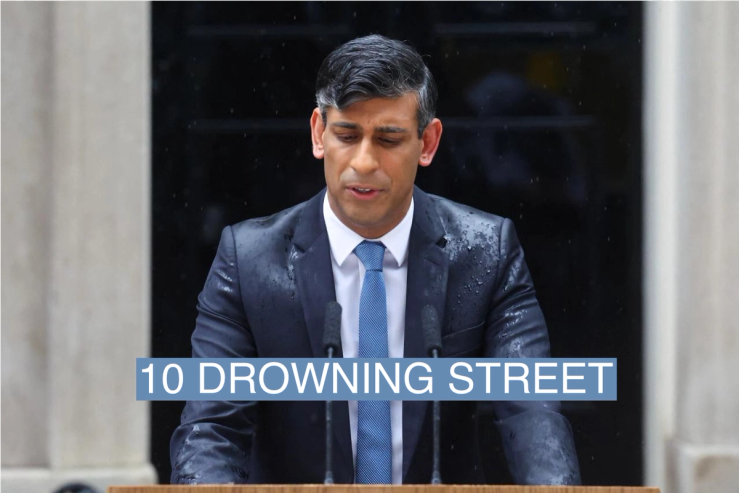The News
In an unexpected move, UK Prime Minister Rishi Sunak announced a July 4 general election. The announcement comes as his Conservative party, which has trailed Labour in the polls for months, remains 20 points behind in the polls.
In a speech outside 10 Downing Street, a rain-soaked Sunak touted recent economic wins and warned that the world is currently “more dangerous than it has been since the end of the Cold War,” setting up security to be a major focus of the Conservative’s campaign.
Under UK law, Sunak was required to hold a vote by January 2025 but has been cagey about timing, with most political analysts expecting an October or November date. The snap decision comes on the heels of a promising Wednesday report that showed inflation dropping to 2.3% — its lowest level in nearly three years, and close to the Bank of England’s target — which had been one of the prime minister’s top priorities.
SIGNALS
It’s a bad time for a Tory election bid — but probably still the best time
Though the Conservative government’s polling currently looks dire, it might be the best Sunak can hope for. Senior Tories have warned the prime minister that things could get worse, urging him to hold a general election to spare himself embarrassment before migrant crossings reach their annual summer peak. Party officials also told the Financial Times there’s no point in the British leader holding out for better economic news; Markets expect inflation to tick upward. “When you’ve had as much bad news as the British PM in recent months, you’ll take anything in the way of good fortune,” as Politico put it.
Voters aren’t necessarily pro-Labour, just tired of Tories
Several British politics watchers said the likely election of a Labour government is more about voting against the Tories than a sign of support for Keir Starmer’s party. Data suggests that Starmer, the likely next PM, and his party are no more popular or trusted than they were heading into 2015. “It is more disgust at the Tories than delight at what Labour offers that is driving politics,” Ben Page, chief executive of polling firm Ipsos, told The Guardian. Other parties are benefitting from voters’ anger at the Tories, too. Frustrated by 14 years of Conservative-led governments, many long-time Tory voters defecting to smaller parties such as the right-wing populist party Reform UK.
Big business is cautiously excited for a Labour future
Big business, eager to hear Labour’s promises of economic stability, has welcomed the party’s strong showing in the polls, but not without reservations, The Economist reported. While Labour’s promises to freeze corporation tax for five years and other business-first policies have been popular with executives — a survey of investors found that a Labour-led government would be the best result for stocks and the pound — they’re concerned about what they see as the party’s inclination to meddle in the market. They’re also worried about employee-rights proposals, including giving workers full rights from their first day and changing the legal definition of “worker” to account for new kinds of employees created by the gig economy.



